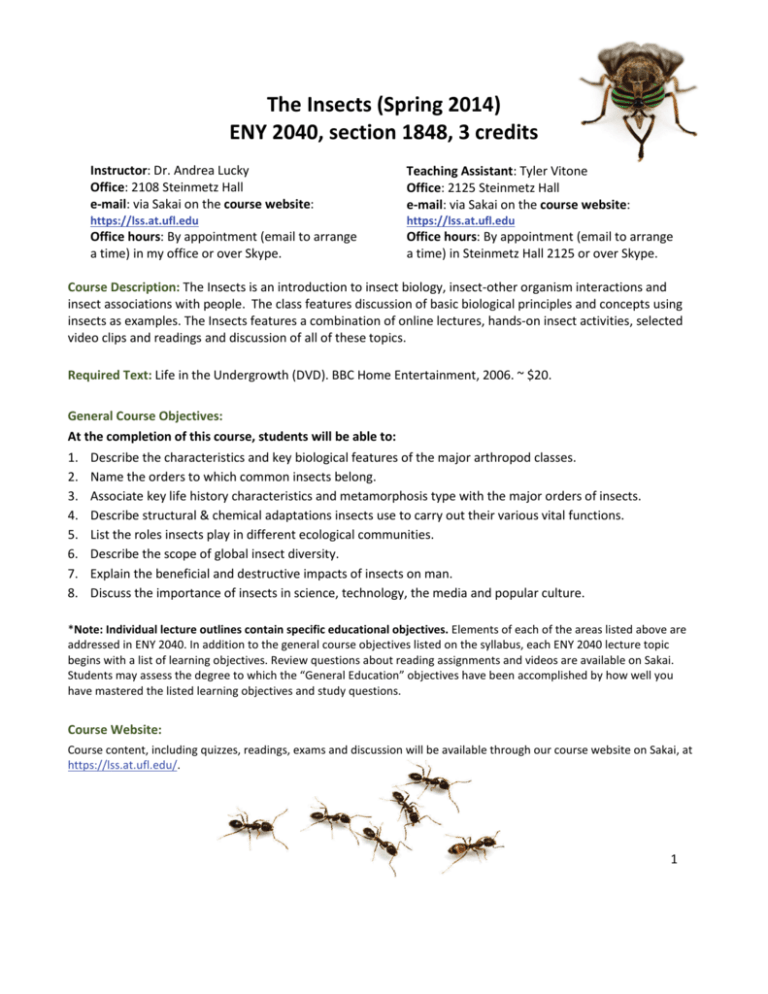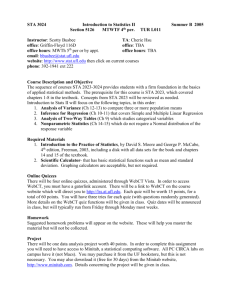ENY 2040 - University of Florida
advertisement

The Insects (Spring 2014) ENY 2040, section 1848, 3 credits Instructor: Dr. Andrea Lucky Office: 2108 Steinmetz Hall e-mail: via Sakai on the course website: Teaching Assistant: Tyler Vitone Office: 2125 Steinmetz Hall e-mail: via Sakai on the course website: Office hours: By appointment (email to arrange a time) in my office or over Skype. Office hours: By appointment (email to arrange a time) in Steinmetz Hall 2125 or over Skype. https://lss.at.ufl.edu https://lss.at.ufl.edu Course Description: The Insects is an introduction to insect biology, insect-other organism interactions and insect associations with people. The class features discussion of basic biological principles and concepts using insects as examples. The Insects features a combination of online lectures, hands-on insect activities, selected video clips and readings and discussion of all of these topics. Required Text: Life in the Undergrowth (DVD). BBC Home Entertainment, 2006. ~ $20. General Course Objectives: At the completion of this course, students will be able to: 1. Describe the characteristics and key biological features of the major arthropod classes. 2. Name the orders to which common insects belong. 3. Associate key life history characteristics and metamorphosis type with the major orders of insects. 4. Describe structural & chemical adaptations insects use to carry out their various vital functions. 5. List the roles insects play in different ecological communities. 6. Describe the scope of global insect diversity. 7. Explain the beneficial and destructive impacts of insects on man. 8. Discuss the importance of insects in science, technology, the media and popular culture. *Note: Individual lecture outlines contain specific educational objectives. Elements of each of the areas listed above are addressed in ENY 2040. In addition to the general course objectives listed on the syllabus, each ENY 2040 lecture topic begins with a list of learning objectives. Review questions about reading assignments and videos are available on Sakai. Students may assess the degree to which the “General Education” objectives have been accomplished by how well you have mastered the listed learning objectives and study questions. Course Website: Course content, including quizzes, readings, exams and discussion will be available through our course website on Sakai, at https://lss.at.ufl.edu/. 1 Course Schedule *Note that this schedule is tentative and subject to change throughout the semester. Check the course website (https://lss.at.ufl.edu/) and your Gatorlink email account regularly for updates! Week wk. 1 Topic Welcome Activities this week Discussion: Introductions Assessments this week Quiz 1 wk. 2 Discussion 1: The many uses of silk Quiz 2 wk. 3 Zoological nomenclature and Classification Arthropods Quiz 3 wk. 4 Insect structure and development wk. 5 Biology of insect orders 1 wk. 6 Biology of insect orders 2 wk. 7 Insect Behavior Discussion 1: Your Response Order butterfly pets! Discussion 2: Animal Experimentation Discussion 2: Your Response Short Insect Report DUE Discussion 3: Pros and cons of complete metamorphosis Discussion 3: Your Response wk. 8 Insect Evolution 1 wk. 9 Insect Evolution 2 wk. 10 Pollination Biology wk. 11 Insects in Science wk. 12 Arthropods and Health wk. 13 Insects in Art, Culture and Industry: Insects in art & history Insects in Art, Culture and Industry: Insects in War Insects in Art, Culture and Industry: Growing & Eating Insects Conclusions wk. 14 wk. 15 wk. 16 Discussion 4: Are insects intelligent? Discussion 4: Your Response Butterfly Worksheets DUE Discussion 5: The evolutionary success of insects Discussion 5: Your Response Quiz 4 Quiz 5, Exam 1 Quiz 6 Quiz 7 Quiz 8 Quiz 9, Exam 2 Quiz 10 Quiz 11 Discussion 6: Can citizens be effective scientists? Discussion 6: Your Response Quiz 12 Informal Discussion Citizen Science Activity DUE Informal Discussion Quiz 14 Informal Discussion Quiz 13 Quiz 15 Course Evaluations, Exam 3 2 General Education Purpose of Course Statement: General Education courses in the biological sciences introduce students to the basic concepts of science and the scientific method and enhance awareness of scientific developments and their impact on society and the environment. This area provides students with an understanding of scientific terms, concepts and theories, and the ability to formulate empirically testable hypotheses derived from the study of living things. Questions about the course. Please ask general questions about the course in the DISCUSSION section of the course website, under the COURSE QUESTIONS. If your question is personal (not general), use the MAIL section to send an email to the instructor. Please check the syllabus for an answer to your question before sending an email. This is much appreciated. Questions that are already answered in the syllabus may not receive a reply. *Check your Gatorlink e-mail on a regular basis for messages sent to the class. Online Classroom Courtesy / Nettiquette: - Respect others and their opinions in class and in online discussions. Act professionally, just as you would in the classroom. Deadlines for online assignments are firm. Exceptions will be considered only for valid reasons (see below under Exam Make Up Policy). Examination & Grading: Course grades are based on exams, activities, discussions and quizzes. Grading Scale is based on 300 possible points. Grades are absolute. There will be no additional extra credit or rounding of grades beyond extra credit opportunities periodically announced in-class. Requests for exceptions will not receive a response! Visit http://www.registrar.ufl.edu/catalog/policies/regulationgrades.html for the UF policy on grading. FINAL GRADING Scale: Percentage Item % of Grade # Points Exam 1 10 30 Exam 2 10 30 Exam 3 20 60 Activities 15 45 Discussions 19 57 Quizzes 26 78 100-93 90-92 87-89 83-86 80-82 77-79 73-76 70-72 67-69 63-66 60-62 0-59 A AB+ B BC+ C CD+ D DE Minimum points required 279 270 261 249 240 231 219 210 201 189 180 <177 REMINDER: Check your e-mail and Sakai on a regular basis for important announcements and schedule changes. Check prior to exams for changes to the material to be covered, and after exams to check your grades! 3 Assignments: Quizzes, Exams, Activities & Discussions Each week there will be one quiz and one discussion response due by FRIDAY at 5pm. Any other assignments for that week, such as hands-on activities and exams, will also be due by Friday at 5pm. Quizzes: Each week’s reading, video and lecture materials have an associated open book 6-pt quiz that you may take at any time before the due date. You can access quizzes on Sakai under ASSESSMENTS. Over the semester there will be approximately 15 quizzes, but only 13 of them will count towards your grade (i.e. the two lowest quiz grades will be dropped). Note: there are no make-up quizzes, so plan ahead! Exam 1 is 30 points and is designed to give you a preview of the exam format and prepare you for Exams 2 and 3. Once you begin the examination, you will be allowed 40 minutes to complete it. Respondus Lockdown Browser is required for all three closed book exams in this course. Notes are not to be consulted for exams. Exam 2 is 30 points (40 minutes). Exam 3 is 60 points (70 minutes). Exam Make-Up Policy: To make up a missed examination, you will be required to provide appropriate written documentation (e.g., from a doctor in case of severe illness or a funeral notice/obituary in case of the death of a close relative). If you miss an examination for one of the valid reasons listed above, you must contact Dr. Lucky immediately to receive permission to take the make-up examination. Requests to take an exam late WITHOUT one of the reasons listed above will be considered, but will automatically result in 10 pts. being deducted from the test score. Technical Difficulty Policy: Any student who has technical trouble with an exam must contact the IT help desk (http://helpdesk.ufl.edu/) to obtain a ticket number BEFORE contacting the instructor. Request to re-take an exam from a student without an IT Help Desk ticket number will not be considered. Activities: There are several insect-based activities to complete in this course. The completed worksheet or final product must be submitted on time for full credit. Discussions: This class features online Discussions in which each student is required to participate weekly. To receive full credit, you must: 1) Answer the weekly discussion question online by Friday at 5pm AND 2) Respond to a classmate’s post by midnight on Friday at 5pm of the following week How to participate in online discussion: In DISCUSSIONS, select the question then click START A NEW CONVERSATION. Title your post: “your last name; topic”. Example: “Lucky: are ants intelligent?”. Express your opinions with professionalism: be polite and use correct grammar and spelling. For full credit, EVERY post must end with a question to move the discussion forward. Study Tip: Review each lecture topic via ungraded review quizzes on Sakai in ASSESSMENTS. Each quiz has 5 randomized questions. You may take each one up to 5 times to get familiar with questions that will likely be on the exams. Grade posting: Grades are posted in the online Gradebook. Please do not e-mail inquiring about your grade, as they will not be given over the phone or by e-mail. If you would like to see your exam or discuss your grade 24 hours after they have been posted, please contact the instructor to schedule an appointment. Evaluations: Before the final exam, you should receive an e-mail about an electronic evaluation from the Dean’s office at UF. All students are expected to fill out this evaluation to assess the quality of this course. 4 GENERAL INFORMATION: UF POLICIES: UNIVERSITY POLICY ON ACCOMMODATING STUDENTS WITH DISABILITIES: Students requesting accommodation for disabilities must first register with the Dean of Students Office (http://www.dso.ufl.edu/drc/). The Dean of Students Office will provide documentation to the student who must then provide this documentation to the instructor when requesting accommodation. You must submit this documentation prior to submitting assignments or taking the quizzes or exams. Accommodations are not retroactive, therefore, students should contact the office as soon as possible in the term for which they are seeking accommodations. UNIVERSITY POLICY ON ACADEMIC MISCONDUCT: Academic honesty and integrity are fundamental values of the University community. Students should be sure that they understand the UF Student Honor Code at http://www.dso.ufl.edu/students.php. As a result of completing the registration, every student has agreed to this statement: “I understand that the University of Florida expects its students to be honest in all their academic work. I agree to adhere to this commitment of academic honesty and understand that my failure to comply with this commitment may result in disciplinary action up to and including expulsion from the University.” ABSENCES AND MAKE-UP WORK. Requirements for class attendance, make-up exams, and other work are consistent with university policies that can be found at: https://catalog.ufl.edu/ugrad/current/regulations/info/attendance.aspx NETIQUETTE: COMMUNICATION COURTESY: All members of the class are expected to follow rules of common courtesy in all email messages, threaded discussions and chats. Failure to do so will result in a grade of zero on an assignment. http://teach.ufl.edu/docs/NetiquetteGuideforOnlineCourses.pdf . GETTING HELP: FOR ISSUES WITH TECHNICAL DIFFICULTIES for E-learning in Sakai, please contact the UF Help Desk at: ● helpdesk@ufl.edu ● (352) 392-HELP - select option 2 ● https://lss.at.ufl.edu/help.shtml ** Any requests for make-ups due to technical issues MUST be accompanied by the ticket number received from LSS when the problem was reported to them. The ticket number will document the time and date of the problem. You MUST e-mail your instructor within 24 hours of the technical difficulty if you wish to request a make-up. IF YOU ARE HAVING PROBLEMS IN SCHOOL please make an appointment to see me, or if appropriate, call one of the counseling services below. Don’t wait until it’s too late! Resources are available at http://www.distance.ufl.edu/gettinghelp for: • • • • Counseling and Wellness resources Disability resources Resources for handling student concerns and complaints Library Help Desk support SHOULD YOU HAVE ANY COMPLAINTS with your experience in this course please visit http://www.distance.ufl.edu/student-complaints to submit a complaint. 5




